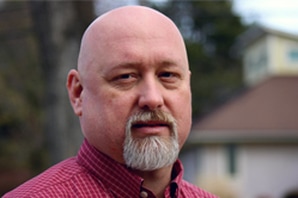|
A Conversation with the Program Director  Program Director, Richi Yowell Program Director, Richi Yowell Richi Yowell became the program director in July 2014, and he brings a vision that is as vibrant as it is forward-looking. His office is a quiet, one-window room, located in the Bender Building, behind the main house. On some days, Yowell spends much of his time here, attending to administrative tasks, preparing to lead group meetings, and talking with individual residents about a variety of concerns they face daily. During other times, Yowell dashes back and forth from his office to the main house, checking on some residents in their rooms, while talking with others in common areas such as the kitchen or front office, and meeting with fellow staff members to stay abreast of current developments in the house. His daily routine offers some insight into the overall nature of Yowell’s work as the program director of Gemeinschaft Home, particularly his role in the lives of residents. Each new day presents a different set of challenges, and Yowell must always find a way to strike a balance between his various responsibilities, pointing out that, “I have to, on one hand, play the disciplinarian, but I also have to be able to have an empathetic ear.” For the most part, Yowell prefers to occupy the latter role, offering guidance and support for residents who struggle with a range of concerns from interpersonal communication, to substance abuse recovery, to post-traumatic stress. Before joining Gemeinschaft Home as the program director, Yowell worked as a probation and parole officer for the Virginia Department of Corrections. But such work largely prevented Yowell from focusing on what he does best, offering guidance and counseling on a sustained, individual basis. Yowell explains that, “Here at Gemeinschaft Home, I can talk to the folks, get involved in their histories. When I had 80 to 100 people in a caseload, I could not take more than 15 to 20 minutes at a time just to check with them one-on-one, because I wouldn’t be getting anything else done.” Yowell argues that his position with Gemeinschaft Home allows him to draw on other aspects of his life experience as well. As an ordained minister, working part-time for a local church, Yowell explains “I’ve gotten to a place in my life right now where everything I do is an extension of ministry.” At Gemeinschaft Home, “I do a lot of the same kinds of work, just listening to people’s problems and trying to help them. I can also interject some aspects of spirituality and faith if it’s welcomed, if it’s invited, and I have prayed with guys before.” The most frustrating aspect of Yowell’s job extends beyond the walls of Gemeinschaft Home and is reflected in broader cultural attitudes about convicted criminals. He explains, “There is a general consensus that they made bad decisions, so they need to be locked up to be punished for those bad decisions, without realizing the root cause of those bad decisions.” As a result, many people are reluctant to welcome formerly incarcerated individuals back into the community after serving a prison sentence, which makes it all the more challenging for residents to move forward in life, after they leave Gemeinschaft Home. “I don’t expect anybody to have a ticker tape parade for these guys coming out of jail or anything,” Yowell admits, “but just an understanding that they can become productive, tax-paying citizens. Many just need a little help: rehabilitation, counseling, and support to integrate back into society.” Yowell argues that “in most cases there are extenuating family circumstances, there is addiction, there are a whole lot of factors that turn somebody into a criminal,” and his goal is help residents to address these deeper (often lifelong) issues while they are in the program. Yet Yowell is quick to point out that the program is no panacea, and the responsibility lies with each resident, who must take an active role in his progress through the program. “The beauty of the program,” he argues, “is that it is an opportunity.” While he is optimistic that residents will take advantage of the opportunity they have during their time in program, Yowell assumes a pragmatic perspective overall, saying “I don’t believe that Gemeinschaft Home cures anybody of criminality or substance abuse in 90 days—I do not think that is really possible—but I do believe that we can give folks some tools and something to think about if they are tempted toward criminal behavior or relapse.” Comments are closed.
|
Archives
August 2023
|